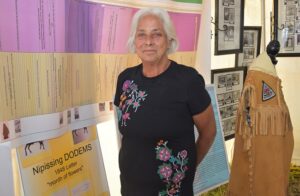Nipissing First Nation Anishinaabekwe receives Honourary Degree from Nipissing University

By Kelly Anne Smith
NIPISSING FIRST NATION— Joan McLeod Shabogesic is an expert storyteller about the people and the land of Nipissing First Nation.
In recognition of her hard work and dedication, Nipissing University has bestowed McLeod Shabogesic with an Honourary Degree.
In conversation with McLeod Shabogesic, she explains the highlights of being the Lands Manager of Nipissing First Nation for 37 years.
“In 1982, Nipissing started telling the Department [of Indian Affairs], ‘We want to have jurisdiction over our land.’ Nipissing First Nation wanted control over it. The only way the Department [of Indian Affairs] could do it was delegate Section 5360 under the Indian Act,” she recalls. “About 1989, there [were] eight First Nations that were about to obtain it [Section 5360]. We realized, as Nations, that it wasn’t going to work. It didn’t do what we wanted it to do, so we started talking about developing a new law.”
“Then there were 14 First Nations at that time. We said, ‘Let’s make a new active government that would cover us.’ We didn’t know what it would look like. At one time, it was called the Chartered Land Act but it became the Land Management Act. Broadly, that pulled us from under the Indian Act. It struck down the parts of the Indian Act that covered land – 14 clauses…Then we were outside the Indian Act and we operated under land code. The 14 First Nations developed that into what was to become the Chief’s Land Advisory Board.”
“Nipissing here, although we always operated as a First Nation that had all our rights, it came into being as the Nipissing Land Codes that were passed in 2003.”
McLeod Shabogesic says Nipissing First Nation started to develop laws on what was important to her community about the land.
“We took control of everything— our whole land base. We put in place our own laws and our governance…If we had a question on it, we went to the people or to Chief and Council. We weren’t waiting for somebody in the Department of Indian Affairs to react or for them to develop policy.”
“The Indian Act was passed in 1867. By 2003, a century and decades later, nobody made any new regulations. They did some. It was the government reacting to Native Land. It wasn’t from the people’s perspective and what they wanted. It was administrative work. It wasn’t really management. They would pass a standing gravel permit if somebody asked for it, that sort of piecemeal thing.”
As Nipissing First Nation passed the land code, McLeod Shabogesic was asked how many laws they had developed. Answering, “Just one,” she knew Nipissing First Nation had a long road ahead.
“It dawned on us that night. This is a whole new game. This is self-governance.”
Laws that Nipissing First Nation developed would no longer need the scrutiny of the Indian Act. The framework agreement with Canada is followed.
“It was a big thing. We’ve been operating now for 18 years. There are always glitches and there are always things that you stumble on— that’s life. You pick yourself up again. You redo it. You re-edit it. You amend it. You make it fit to what your people find accepting for their management scheme for their land.”
In her acceptance speech to Nipissing University, McLeod Shabogesic acknowledges all of the land managers that she has met.
“We could commiserate and exchange ideas. It wasn’t a one-person job. It took a lot of people to do it.”
History has always been very important to McLeod Shabogesic.
“Using history and our ancestors past when they were in this world instills nation-building and pride in our community. Every one of our communities has problems with the social stuff and then we have problems with agreeing with everything. But if everyone— I think— sees through history, we all have a commonality here and that’s to live the best we can on the earth while we are here. That’s what history shows us.”
McLeod Shabogesic continues to work with Nipissing First Nation Cultural and Heritage Manager Glenna Beaucage. She also works with Kirsten Greer of Nipissing University researching Nipissing First Nation dodems (clans) of the Anishinaabe.
“We want to replace them or get a good idea of what they were. Going into historical documents and trying to see what people were saying or recording.”
McLeod Shabogesic advocates for a repository for historical and cultural artifacts of Nipissing First Nation. But with the coronavirus disease 2019 (COVID-19) pandemic stalling plans, she now foresees a virtual exhibition as being more useful in the near future.
With the summer here, McLeod Shabogesic is really enjoying her property, having been too busy with work in the past.
“That’s my big thing I really like doing is puttering around my yard. I’m coping with going into retirement. It’s been a little over a year now. It’s freedom. I love it.”
McLeod Shabogesic’s daily priority is a walk/run to stay healthy to fight COVID-19.
“I’m really trying to stay involved with our First Nation,” she says. “I will assist anytime I can. That’s how I was raised by my family— to give back to your community. If you want your life to be better, everybody has to have a good life. At least you are there if somebody needs something. My Mom, Leda Couchie McLeod said, ‘No matter what, somebody is some mother’s baby so you have to look after them.’”

